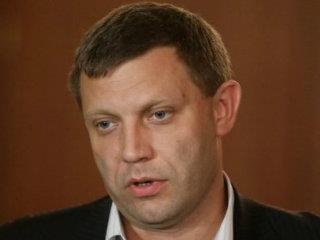Leader of Ukrainian breakaway republic calls on EU to "do everything possible" to prevent further escalation
An exclusive interview with Alexander Zakharchenko by Martin Banks.

The demand by Alexander Zakharchenko, who has been leader of the self-proclaimed Donetsk People’s Republic since August is a "clear cut" message for Brussels: "I would say to the EU – let`s start talking, let`s start a dialogue.
The demand by Alexander Zakharchenko, who has been leader of
the self-proclaimed Donetsk People’s Republic since August is a "clear
cut" message for Brussels: "I would say to the EU – let`s start talking, let' s
start a dialogue. We are reliable partners who observe all agreements. We do
not have any aggressive intentions and we are targeting at cooperation, in all
fields”. "We have large economic potential, fertile lands and very
talented people. Now we are free from the stranglehold of Kiev and consequently
free from corruption, looting of state money and oligarchs` dictatorship. The
future belongs to us."
Zakharchenko was speaking in the margins of a 'peace and
unity' forum, in the war-devastated city of Donetsk. The two-day event
comprised national parliamentarians, representatives from civil society and the
international media. The 39-year-old, who is key figure
in any resolution to the bitter year-long conflict, said the "first and main"
challenge facing the international community was restoring peace to
war-torn eastern Ukraine.
"Not a
ceasefire," he insisted, "but a genuine solid peace. Then comes the
serious work of consolidation of all branches of power. I mean executive,
legislative powers, ministries and other state bodies, including the judicial
system. All those branches must work as one mechanism.” "This is a
difficult task taking into consideration the Ukrainian administrative heritage.
We have already started this work and I`m sure, while living in peace, we will
manage to build an effective administrative system for our republic within a
short period of time and be able to restore our country and economic
growth very soon."
On the current
fragile ceasefire, which was brokered in Minsk in February, he said, "As a
result of pressure from European leaders and the Russian President Kiev agreed
to sign Minsk accords. The Ukrainian army even withdrew heavy weapons from some
parts of the front line. But at the same time we constantly record shelling of
our positions from the Ukrainian side. The most frightful is shelling of
residential districts of our towns." Expanding on this, he said,
"We witness gunfire along the whole front line, almost on a daily basis.
Most ceasefire violations take place in those areas which are controlled by
Ukrainian units not subordinated to Kiev. To prove my words you may turn to the
OSCE mission reports. These reports contain facts that speak for
themselves."
The Organisation for Security and Co-operation in Europe (OSCE), the
group charged with overseeing the Minsk agreement, recently reported more than
1,100 explosions in and around Donetsk. Zakharchenko went on, "I can assure you that we
fully honour all points of Minsk agreements, we follow its spirit. We removed
all heavy weapons, we are open for contacts, consultations and dialogue 24
hours a day. We even passed all Ukrainian army captives without exchanging
them for our people, including lots of civilians. We constantly make such
gestures of goodwill. In return we receive only empty promises from Kiev,
continuation of the economic blockade and military provocations. I do hope that
the coming meetings will help move the situation from the dead-point as regards
to implementation of the whole complex of measures."
More than 6,200 people are believed to have been killed since April
2014 and more than one million have fled their homes since the conflict erupted
just over one year ago in Donetsk and Luhansk. Aid organisations have warned of
a brewing humanitarian crisis. Turning to the current humanitarian situation in
Donbas, Zakharchenko said,"It is still very hard but we have
managed to avoid a catastrophy. We started to pay pensions and social payments
in full. We pay salaries and regular social subsidies to families with
small children and young mothers. There is growth of industrial output in our
plants and factories. This is a very positive signal. It means that our economy
is starting to revive."
More than 1.2 million have registered with the Ukrainian government
as internally displaced. But the actual number is likely to be far higher.
Zakharchenko continued,
"As for internally displaced people, many of them fully or partly lost
their houses as a results of artillery gunfire. It is impossible to rebuild
their houses at present because most of them are situated on the front line,
so for the civil population it is not safe to be there. But none of those
people are homeless, none of them starve. We managed to find temporary homes
for them, guaranteed food supplies and clothes for them. Here I must thank
Russia... without its massive humanitarian help the state of refugees
could be catastrophic. Today, they have everything necessary, starting from
food to toys for children."
Zakharchenko was a keynote speaker at the peace forum (11 and 12
May): "Donbass: Yesterday, Today and Tomorrow". It
was attended by more than 500 people from several EU member states
and senior representatives of the governments of the Donetsk and Lugansk
republics. The event coincided with the first anniversary of elections on
establishing self-rule in the two republics. The poll was not recognised
by most countries but a majority of respondents were said to have supported
some form of self-rule for Donetsk and Lugansk.



 By: N. Peter Kramer
By: N. Peter Kramer

